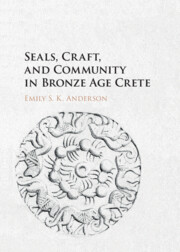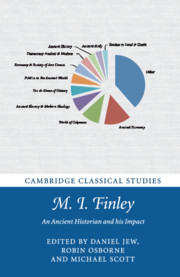Refine search
Actions for selected content:
23990 results in Ancient history
Chapter 10 - The End of the Ancient City?
-
- Book:
- The Ancient City
- Published online:
- 10 November 2016
- Print publication:
- 31 October 2016, pp 167-185
-
- Chapter
- Export citation
Preface
-
- Book:
- Ritual Sites and Religious Rivalries in Late Roman North Africa
- Published online:
- 17 November 2016
- Print publication:
- 24 October 2016, pp xiii-xiv
-
- Chapter
- Export citation
Illustrations
-
- Book:
- Ritual Sites and Religious Rivalries in Late Roman North Africa
- Published online:
- 17 November 2016
- Print publication:
- 24 October 2016, pp ix-xii
-
- Chapter
- Export citation
3 - Internecine Christian Contestation
-
- Book:
- Ritual Sites and Religious Rivalries in Late Roman North Africa
- Published online:
- 17 November 2016
- Print publication:
- 24 October 2016, pp 119-175
-
- Chapter
- Export citation
1 - Foundational Assumptions
-
- Book:
- Ritual Sites and Religious Rivalries in Late Roman North Africa
- Published online:
- 17 November 2016
- Print publication:
- 24 October 2016, pp 41-73
-
- Chapter
- Export citation
Dedication
-
- Book:
- Ritual Sites and Religious Rivalries in Late Roman North Africa
- Published online:
- 17 November 2016
- Print publication:
- 24 October 2016, pp v-vi
-
- Chapter
- Export citation
2 - Christian Perceptions of Communal Places
-
- Book:
- Ritual Sites and Religious Rivalries in Late Roman North Africa
- Published online:
- 17 November 2016
- Print publication:
- 24 October 2016, pp 74-118
-
- Chapter
- Export citation
Contents
-
- Book:
- Ritual Sites and Religious Rivalries in Late Roman North Africa
- Published online:
- 17 November 2016
- Print publication:
- 24 October 2016, pp vii-viii
-
- Chapter
- Export citation
Conclusion: Ritual Spatial Control, Authority, and Identification
-
- Book:
- Ritual Sites and Religious Rivalries in Late Roman North Africa
- Published online:
- 17 November 2016
- Print publication:
- 24 October 2016, pp 237-244
-
- Chapter
- Export citation
Index
-
- Book:
- Ritual Sites and Religious Rivalries in Late Roman North Africa
- Published online:
- 17 November 2016
- Print publication:
- 24 October 2016, pp 271-279
-
- Chapter
- Export citation
4 - Christian Supersession of Traditional Roman Temples
-
- Book:
- Ritual Sites and Religious Rivalries in Late Roman North Africa
- Published online:
- 17 November 2016
- Print publication:
- 24 October 2016, pp 176-214
-
- Chapter
- Export citation
Select Bibliography
-
- Book:
- Ritual Sites and Religious Rivalries in Late Roman North Africa
- Published online:
- 17 November 2016
- Print publication:
- 24 October 2016, pp 245-270
-
- Chapter
- Export citation
Introduction: Scaffolding
-
- Book:
- Ritual Sites and Religious Rivalries in Late Roman North Africa
- Published online:
- 17 November 2016
- Print publication:
- 24 October 2016, pp 1-40
-
- Chapter
- Export citation
Abbreviations
-
- Book:
- Ritual Sites and Religious Rivalries in Late Roman North Africa
- Published online:
- 17 November 2016
- Print publication:
- 24 October 2016, pp xv-xviii
-
- Chapter
- Export citation
5 - Christian Supersession of Synagogues
-
- Book:
- Ritual Sites and Religious Rivalries in Late Roman North Africa
- Published online:
- 17 November 2016
- Print publication:
- 24 October 2016, pp 215-236
-
- Chapter
- Export citation
Copyright page
-
- Book:
- Ritual Sites and Religious Rivalries in Late Roman North Africa
- Published online:
- 17 November 2016
- Print publication:
- 24 October 2016, pp iv-iv
-
- Chapter
- Export citation

Seals, Craft, and Community in Bronze Age Crete
-
- Published online:
- 20 October 2016
- Print publication:
- 14 October 2016

M. I. Finley
- An Ancient Historian and his Impact
-
- Published online:
- 20 October 2016
- Print publication:
- 13 October 2016
Copyright page
-
- Book:
- Seals, Craft, and Community in Bronze Age Crete
- Published online:
- 20 October 2016
- Print publication:
- 14 October 2016, pp iv-iv
-
- Chapter
- Export citation
Index
-
- Book:
- Seals, Craft, and Community in Bronze Age Crete
- Published online:
- 20 October 2016
- Print publication:
- 14 October 2016, pp 321-324
-
- Chapter
- Export citation
